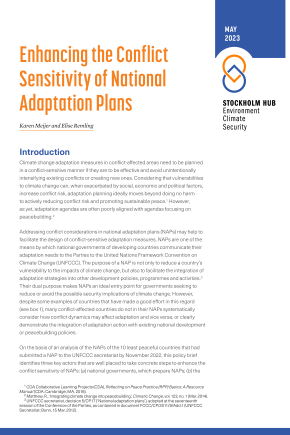Enhancing the Conflict Sensitivity of National Adaptation Plans
With climate change potentially influencing conflict risks, addressing conflict considerations in national adaptation plans (NAPs) may help facilitate the design of conflict-sensitive measures that do not exacerbate, and ideally reduce, said risks. This analysis of the 10 least peaceful countries’ NAPs that were submitted to the United Nations Framework Convention on Climate Change (UNFCCC) secretariat by November 2022 found varying references to conflict, but no systematic consideration of conflict aspects. This policy brief identifies three key actors well placed to take concrete steps to enhance the conflict-sensitivity of NAPs: (a) national governments, which prepare NAPs; (b) the Least Developed Countries Expert Group (LEG) under the UNFCCC, which guides the NAP process; and (c) international climate finance providers, which support adaptation action. By stepping up requirements for conflict-sensitivity in adaptation planning and providing guidance on how best to identify and address climate-related conflict risks, national governments could be incentivized and supported to explore the possibilities for adaptation doing no harm, actively reducing conflict risks and even contributing to peace.
Introduction
Interactions between conflict, climate change and adaptation action
Key actors and steps
Ways forward


